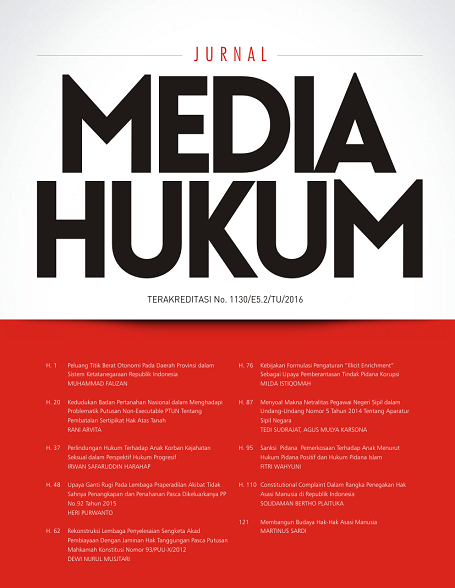Politico-Legal Review of the Revised-Bill of the Corruption Eradication Commission and Omnibus Law
DOI:
https://doi.org/10.18196/jmh.v28i2.11403Keywords:
consensus, democracy, formulation of law, paradoxAbstract
The paper aims to prove that political compromise may create legal antagonisms, paradoxes and strengthen the influence of elite-oligarchy. The paper is based on the theory that the concept of consensus in the context of the political system is closely related to the Indonesian cultural democracy. However, in the implementation, there is an underlying principle of checks and balances as a systemic guarantee, so that democracy is not merely a tool of ‘killing ground of freedom’ to manipulate the essence of democracy itself, in particular, by the dominant forces of the elite and the oligarchy. Through the socio-historical method (empirical approach), this paper examined the emergence of the phenomenon of antagonism and paradox of regulatory formulation, such as the revision of the Bill for Eradicating Corruption which weakens anti-corruption institutions, Corruption Eradication Commission, to the creation of Omnibus Law, which is considered to make labors structurally marginalized. The investigation discovered that those legal products are distorted and should be originally created to achieve the benefit and interest of society at large. In contrast, they are falsified and manipulated under the banner of ‘consensus’ democracy steered by the limited elite-oligarchy of the Political Parties.
References
Academic Paper on the Draft Law on the Formation of Legislation, Legislative Body of the Indonesian House of Representatives, 2010
Akbar, C. (2021). Aturan Yang Menjadi Sorotan di Aturan Turunan UU Cipta Kerja: Ada soal PHK dan Upah. Available online from www.nasional.tempo.co/ 2021.[Accessed February 27,2021].
Ashiddiqie, J. (2011). Hukum Tata Negara dan Pilar-Pilar Demokrasi. Sinar Grafika.
Ashiddiqie, J. Ideologi, Pancasila dan Konstitusi. Writing published by the Constitutional Court of the Republic of Indonesia. Available online from www.mkri.id. [Accessed February 27,2021].
Asshiddiqie, J. (2010). Konstitusi dan Konstitusionalisme Indonesia. Sinar Grafika.
Asshiddiqie, J. (2010). Perihal Undang-Undang. Raja Grafindo Persada.
Astomo, P. (2018). Ilmu Perundang-Undangan Teori dan Praktik di Indonesia. Raja Grafindo Persada.
Bahtiar, F. (2020). Busyro Muqoddas Kritik Sistem Politik, Pembahasan RUU, hingga jalannya pemerintahan. Available online from www.nasional.sindonews.com/159716. [Accessed March 30, 2021].
Biezen, V., Ingrid & Katz, R S. (2015). Democracy and Political Parties. University of Birmingham, Paper of workshop ECPR Joint Session, Granada, April, 2015.p.1-10.
Bland, B. (2020). Man of Contradictions. Penguin Books, Lowy Institute for International Policy, Penguin Random House Australia.
Budiarti, U P. & Chairunnisa, N. (2020). Begini Sikap Fraksi-Fraksi di DPR atas RUU Cipta Kerja. Available online from www.tempo.nasional.com. [Accessed March 16, 2021]
Bustamin, R J. (2019). Urgensi Checks and Balances Ketatanegaraan Indonesia dan Islam. Jurnal Ilmiah Syariah, 18(2), 221-232.
Butt, S. & Lindsey, T. (2018). Indonesian Law. Oxford University Press.
Cahyani, D R. (2020). Muhammadiyah Tolak RUU Cipta Kerja, Minta Pembahasan dihentikan. Available online from www.bisnis.tempo.co/amp/1344929. [Accessed March 30, 2021]
Chandranegara, I S. (2016). Penuangan Checks and Balances ke dalam konstitusi. Journal of the Constitution, (13)3, 552-274
CNN Indonesia. (2019). Political Reconciliation and Worries of Damaging Democracy. Available online from www.m.cnnindonesia.com/2019, [Accessed February 27, 2021]
Constitution Magazine. (2020). Available online from www.mkri.id, Number 160, [Accessed February 27, 2021].
Constitution of the Republic of Indonesia of 1945.
Decision of the Constitutional Court of the Republic of Indonesia Number 012-016-019 / PUU-IV / 2006 concerning the Review of Law of the Republic of Indonesia Number 30 of 2002 concerning the Corruption Eradication Commission (State Gazette of the Republic of Indonesia of 2002 Number 137, Supplement to the State Gazette of the Republic of Indonesia Number 4250, hereinafter referred to as the KPK Law)
Dharmastuti, H. (2021). Revisi UU KPK di Momen Anjloknya Indeks Persepsi Korupsi. Available online from http:/ www. news.detik.com/ 2021. [Accessed February 27, 2021]
DPR RI. (2020). DPR Plenary Meeting Approves the KPK Law. (2020). Available online from www.dpr.go.id, [Accessed March 16, 2021]
Fahmi, K. (2011). Pemilihan Umum dan Kedaulatan Rakyat. PT RajaGrafindo.
Fajar, M. & Achmad, Y. (2013). Dualisme Penelitian Hukum Normatif & Empiris. Pustaka Pelajar.
Harjono, D K. (2020). Konsep Omnibus Law Ditinjau dari Undang-Undang No.12 Tahun 2011 tentang Pembentukan Peraturan Perundang-Undangan. Jurnal Hukum, 6(2), 96-119.
Hayward, K. (2015). Conflict and consensus, In International Encyclopedia of the Social & Behavioral Sciences. Queen's University Belfast, Oxford: Elsevier.
Heryanto, G G. (2015). Model Hubungan Politik Era Pemerintahan Jokowi: Mengkaji Peran Media dan Partisipasi Publik. Journal of Communicate, 1(1), 31-43.
Howe, S T. (1916). Governmental Checks and Balances. Proceedings of the Annual Conference on Taxation under the Auspices of the National Tax Association.p.154-163
Kartika, S D. (2020). Politik Hukum RUU Cipta Kerja, Kajian Singkat Terhadap Isu Aktual dan Strategis. Info Singkat, 12(4),1-6.
Korslak, D. (2014). The concept of legal state. Vestnik Omskogo Universiteta, 41(4), 121-130.
KRHN (Consortium for National Law Reform). (2008). Menggapai Keadilan Konstitusi Suatu Rekomendasi Untuk Revisi UU Mahkamah Konstitusi. KRHN.
Law of the Republic of Indonesia No.40 of 2007 concerning Limited Liability Companies.
Law of the Republic of Indonesia Number 12 of 2011 concerning the Establishment of Legislative Regulations.
Law of the Republic of Indonesia Number 15 of 2019 concerning Amendments to Law Number 12 of 2011 concerning the Formation of Laws and Regulations.
Law of the Republic of Indonesia Number 19 of 2019 concerning Second Amendment to Law Number 30 of 2002 concerning the Corruption Eradication Commission.
Law of the Republic of Indonesia Number 39 of 1999 concerning Human Rights.
Moonti, R M. (2017). Ilmu Perundang-Undangan. Keretakupa
Motiwal, O P. (1974). The Principles of Legislative Drafting, Journal of the Indian Law Institute, 16(1), 11-47
Nadapdap, B. (2016). Hukum Perseroan Terbatas. Jala Permata Aksara.
Natabaya, H.A.S. (2006). Sistem Peraturan Perundang-Undangan Indonesia. Secretariat General and Registrar's Office of the Indonesian Constitutional Court.
Perwira, I. (2016). Refleksi Fenomena Judicialization of politics pada Politik Hukum Pembentukan Mahkamah Konstitusi dan Putusan Mahkamah Konstitusi. Constitutional Journal of Padjadjaran University, 13(1), 27-45.
Pratama, A M. (2013). The Legal Position of the President Against Political Parties. Faculty of Law, Brawijaya University.
Putra, A. (2020). Penerapan Omnibus Law dalam Upaya Reformasi Regulasi, Indonesian Legislation Journal. Center for Indonesian Law and Policy Studies (PSHK), 17(1), 1-10.
Rahardjo, S. (2006). Hukum Dalam Jagat Ketertiban. UKI press.
Rahmasari, B. (2016). Mekanisme dan Dasar Keberlakuan Legal Drafting di Indonesia. Legal Journal, 13(1), 71-87.
Rahmatullah, I. (2013). Rejuvinasi checks and balances dalam system ketatanegaraan di Indonesia. Jurnal Cita Hukum, 1(2), 215-225.
Ramadhan, A. (2019) 26 Poin dari UU KPK Hasil Revisi yang Berisiko Melemahkan KPK, http: /www.kompas.com/nasional/2019,[Accessed February 27, 2021]
Ramadhana, K. & Oktriyal, A. (2020). Laporan Penelitian Proyeksi Masa Depan Pemberantasan Korupsi Menelisik Pengesahan Revisi Undang-Undang KPK. Indonesia Corruption Watch.
Redi, A. (2018). Hukum Pembentukan Peraturan Perundang-Undangan. Sinar grafika.
Riyanto, S. & Sumardjono, M S W. (2020). Kertas Kebijakan Catatan Kritis Terhadap UU No.11 Tahun 2020 tentang Cipta Kerja (Pengesahan DPR 5 Oktober 2020). Faculty of Law, Gadjah Madah University.
Rolando, F S. (2021). 22 Anggota DPR Tersangka Korupsi Sepanjang 2014-2019. Available online from: http:/www.news.detik.com/ 2019, [Accessed February 27, 2021]
Samuel, B. (2019). Ketika Oligarki Menyandera Partai Politik : Studi Kasus Musyawarah Nasonal Luar Biasa Partai Golongan Karya (Golkar) Tahun 2016. Department of Politics and Government, 1-10
Saraswati, L G. & Basari, T. (2006). Hak Asasi Manusia Teori, Hukum. Philosophy UI Press.
Singh, T B. (1996). Principle of separation of power and concentration of authority. Institute's Journal, 1(March), 1-11.
Sodikin. (2020). Paradigma Undang-Undang dengan Konsep Omnibus Law Berkaitan dengan Norma Hukum yang Berlaku di Indonesia. Jurnal RechtVinding, 9(1), 143-159.
Sulardi. (2020). Building Quality of Democracy and Democratization of Political Party’s Leader Election. Jurnal Media Hukum, 27(1), 33-42.
Sunarto. (2016). Prinsip Check and Balances Dalam Sistem Ketatanegaraan Indonesia, Journal of Legal Issues, 45(2), 157-162.
Suntoro, A. (2020). Penyadapan dan Eksistensi Dewan Pengawas Komisi Pemberantasan Tindak Pidana Korupsi. Jurnal Indonesian Legislation, 17(1), 25-34.
www.kpk.go.id [Accessed February 27, 2021].
Yulianto. (2020). Politik Hukum Revisi Undang-Undang KPK yang Melemahkan Pemberantarasan Korupsi. Journal of Cakrawala Hukum, 11(1), 111-123.










